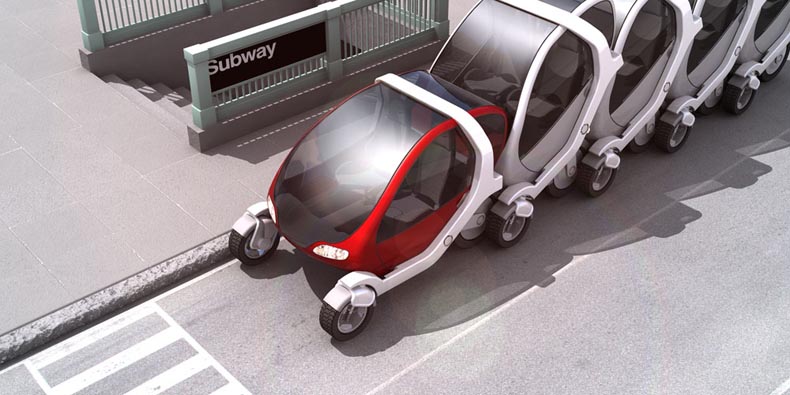
It’s still only an idea. But a fine one from MIT’s The Media Lab‘s Smart Cities. A futuristic electric CityCar that can drive itself and, at the press of a button, look for a parking spot behind others like itself, then fold in half and stack like a shopping cart. Reuters reports that a miniature mock-up version has gone on display at a campus museum, and there are plans to build a full-scale model this spring. Wired’s blog Autotopia explained the car’s premise some time ago:
The GM-backed CityCar prototype is a lightweight electric vehicle that’s cheap to make and could be folded and stacked at transit hubs for rental by commuters under a shared-use model. The trick is to rethink the wheel. In the CityCar, a robotic drive system controls electric motors, steering and braking mechanisms, suspension, and digital controls embedded in each wheel — all integrated into plug-and-play sealed units that can be snapped on and off… Besides its stackability, its omnidirectional wheel configuration enables a turning radius of zero, turning U-turns into O-turns… Other features: push-button start, handlebars where the steering wheel would be, and a body made of Kevlar, carbon fiber, or some other lightweight composite.
Imagine if parking, drive time, congestion, navigation, and your fellow driver was no longer an issue. Imagine what that might do to emotional health, personal time & energy budgets, neighborly love, and the big CO2 footprint in the sky. Imagine if we didn’t need to compete for space but could happily piggyback on each other. Okay, call me an idealist but there are days when the future looks good enough for hope… You’ll have to navigate on your own through the Smart Cities pages to find the City Car. But it’s a really fun ride.
Julia Whitty is Mother Jones’ environmental correspondent, lecturer, and 2008 winner of the John Burroughs Medal Award. You can read from her new book, The Fragile Edge, and other writings, here.















